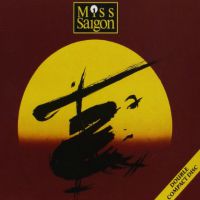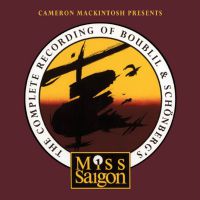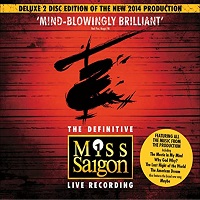 Original London Cast, 1989 (Geffen, 2CDs) No stars; not recommended. As was the case with The Phantom of the Opera and Les Misérables, its equally lamentable predecessors, Miss Saigon was brought into the world by people who followed a crooked path to enormous popular and financial (but not artistic) success: Create a poorly written stage musical based on a story that has been beloved for generations and, with the help of shrewd marketing, it will run for years even if the adaptation is third-rate, or worse. The plot of Miss Saigon is based on that of the Puccini opera Madama Butterfly and its antecedents, with the action reset to the era of the Vietnam War. But the Claude-Michel Schönberg-Alain Boublil show built around that intriguing concept has one of the most impoverished scores ever contrived for the musical theater, including some dicey borrowings from the works of other composers; for instance, “Why, God, Why?” begins with a beautiful tune that was originally written by Richard Rodgers for “There’s a Small Hotel” in On Your Toes. The Francophone librettist Boublil’s collaboration with Richard Maltby, Jr. yielded lyrics that are awkwardly phrased to the point of semi-literacy. (A few examples among dozens: “God, the tension is high, not to mention the smell,” “My parents got themselves killed in the week you changed sides,” and “You must decide upon which side you’re really on.” ) The song “Movie in My Mind” illustrates the chasm between the creators’ goals and their abilities: The idea of the Vietnamese prostitutes imagining an alternate reality in order to bear the selling of their bodies is interesting, but the music and lyrics are utterly pedestrian. Although it’s difficult to identify the nadir of the score, one good candidate is “Bui Doi,” a shamelessly manipulative plea on behalf of children sired by American servicemen and left behind in Vietnam; experiencing Miss Saigon via audio recording at least spares one having to view the tasteless film that was projected onstage during this sequence. Listeners are also spared the spectacle of the completely Caucasian-looking and British-sounding Jonathan Pryce in the role of the Engineer, a reprehensible Eurasian pimp, but Pryce is badly miscast even from an aural standpoint. On the plus side, Lea Salonga sounds lovely and winsome as Kim. Simon Bowman as her lover, Chris, sings well but doesn’t sound American, which is a problem in terms of the plot. — Michael Portantiere
Original London Cast, 1989 (Geffen, 2CDs) No stars; not recommended. As was the case with The Phantom of the Opera and Les Misérables, its equally lamentable predecessors, Miss Saigon was brought into the world by people who followed a crooked path to enormous popular and financial (but not artistic) success: Create a poorly written stage musical based on a story that has been beloved for generations and, with the help of shrewd marketing, it will run for years even if the adaptation is third-rate, or worse. The plot of Miss Saigon is based on that of the Puccini opera Madama Butterfly and its antecedents, with the action reset to the era of the Vietnam War. But the Claude-Michel Schönberg-Alain Boublil show built around that intriguing concept has one of the most impoverished scores ever contrived for the musical theater, including some dicey borrowings from the works of other composers; for instance, “Why, God, Why?” begins with a beautiful tune that was originally written by Richard Rodgers for “There’s a Small Hotel” in On Your Toes. The Francophone librettist Boublil’s collaboration with Richard Maltby, Jr. yielded lyrics that are awkwardly phrased to the point of semi-literacy. (A few examples among dozens: “God, the tension is high, not to mention the smell,” “My parents got themselves killed in the week you changed sides,” and “You must decide upon which side you’re really on.” ) The song “Movie in My Mind” illustrates the chasm between the creators’ goals and their abilities: The idea of the Vietnamese prostitutes imagining an alternate reality in order to bear the selling of their bodies is interesting, but the music and lyrics are utterly pedestrian. Although it’s difficult to identify the nadir of the score, one good candidate is “Bui Doi,” a shamelessly manipulative plea on behalf of children sired by American servicemen and left behind in Vietnam; experiencing Miss Saigon via audio recording at least spares one having to view the tasteless film that was projected onstage during this sequence. Listeners are also spared the spectacle of the completely Caucasian-looking and British-sounding Jonathan Pryce in the role of the Engineer, a reprehensible Eurasian pimp, but Pryce is badly miscast even from an aural standpoint. On the plus side, Lea Salonga sounds lovely and winsome as Kim. Simon Bowman as her lover, Chris, sings well but doesn’t sound American, which is a problem in terms of the plot. — Michael Portantiere
 Studio Cast, 1995 (Angel, 2CDs) No stars; not recommended. The CD booklet notes assure us that there was much more to the success of Miss Saigon than the stunning onstage simulation of the landing and takeoff of a helicopter. Yet this recording begins with the whirring of chopper blades, as if to admit: “Yes, that special effect is what most people will remember about the show.” Billed as a “complete recording,” it includes revisions of the score that were made following the London production. The cast, drawn from several of the show’s worldwide productions, is backed by a huge orchestra. Joanna Ampil’s Kim is very much in the Lea Salonga mold, which is a good thing. The partly Asian Kevin Gray brings credibility to the role of the Engineer, but even he can’t triumph over such dreck as “The American Dream,” a hit-them-over-the-head number in which the title phrase is repeated 18 times. Like his recorded predecessor in the role of Chris, Peter Cousens, from the Sydney company, has a fine voice but is unable to sound convincingly American. Hinton Battle sings John’s “Bui Doi” for all it’s worth, which is very little, and the thankless role of Ellen is well handled by Ruthie Henshall. The orchestra, conducted by David Charles Abell, plays beautifully, and the sound quality of the recording is superb, but it’s all in service of a score that, unsurprisingly, seems to have had no staying power whatsoever outside of the show itself. — M.P.
Studio Cast, 1995 (Angel, 2CDs) No stars; not recommended. The CD booklet notes assure us that there was much more to the success of Miss Saigon than the stunning onstage simulation of the landing and takeoff of a helicopter. Yet this recording begins with the whirring of chopper blades, as if to admit: “Yes, that special effect is what most people will remember about the show.” Billed as a “complete recording,” it includes revisions of the score that were made following the London production. The cast, drawn from several of the show’s worldwide productions, is backed by a huge orchestra. Joanna Ampil’s Kim is very much in the Lea Salonga mold, which is a good thing. The partly Asian Kevin Gray brings credibility to the role of the Engineer, but even he can’t triumph over such dreck as “The American Dream,” a hit-them-over-the-head number in which the title phrase is repeated 18 times. Like his recorded predecessor in the role of Chris, Peter Cousens, from the Sydney company, has a fine voice but is unable to sound convincingly American. Hinton Battle sings John’s “Bui Doi” for all it’s worth, which is very little, and the thankless role of Ellen is well handled by Ruthie Henshall. The orchestra, conducted by David Charles Abell, plays beautifully, and the sound quality of the recording is superb, but it’s all in service of a score that, unsurprisingly, seems to have had no staying power whatsoever outside of the show itself. — M.P.
 London Cast, 2014 (Verve, 2CDs) No stars; not recommended. Can the phrase “diminishing returns” be applied to the third cast album of a show when its score has so little worth to begin with? This is arrogantly billed as the “definitive recording” of Miss Saigon, and it’s probably best to leave it to fans of the show to decide whether or not they agree with that assessment. Many of the lyrics were rewritten for this 25th anniversary production, but not necessarily for the better. Some of the new lyrics do improve at least somewhat on the horrendous grammar of the originals, but the main impetus for the rewrites seems to have been to make the show more graphic in terms of sex and grit — so much so that this live recording bears an “explicit lyrics” warning. (Example, “If I’m your pin-up, I’ll melt all your brass, stuck on your ball with a pin in my ass.” Seriously.) As for the cast, Jon Jon Briones is an appropriately oily Engineer; Eva Noblezada’s voice is capable of sweetness and power as necessary in the role of Kim; and Alistair Brammer has a lovely, lyrical tenor, plus he’s the only recorded Chris who sounds convincingly American rather than British. (Note: After its run at the Prince Edward Theatre in London, this production transferred to Broadway, and Briones won a Tony Award for his performance. A high quality video of the production, captured in London, is also available for those who have any interest in such an item.) — M.P.
London Cast, 2014 (Verve, 2CDs) No stars; not recommended. Can the phrase “diminishing returns” be applied to the third cast album of a show when its score has so little worth to begin with? This is arrogantly billed as the “definitive recording” of Miss Saigon, and it’s probably best to leave it to fans of the show to decide whether or not they agree with that assessment. Many of the lyrics were rewritten for this 25th anniversary production, but not necessarily for the better. Some of the new lyrics do improve at least somewhat on the horrendous grammar of the originals, but the main impetus for the rewrites seems to have been to make the show more graphic in terms of sex and grit — so much so that this live recording bears an “explicit lyrics” warning. (Example, “If I’m your pin-up, I’ll melt all your brass, stuck on your ball with a pin in my ass.” Seriously.) As for the cast, Jon Jon Briones is an appropriately oily Engineer; Eva Noblezada’s voice is capable of sweetness and power as necessary in the role of Kim; and Alistair Brammer has a lovely, lyrical tenor, plus he’s the only recorded Chris who sounds convincingly American rather than British. (Note: After its run at the Prince Edward Theatre in London, this production transferred to Broadway, and Briones won a Tony Award for his performance. A high quality video of the production, captured in London, is also available for those who have any interest in such an item.) — M.P.

